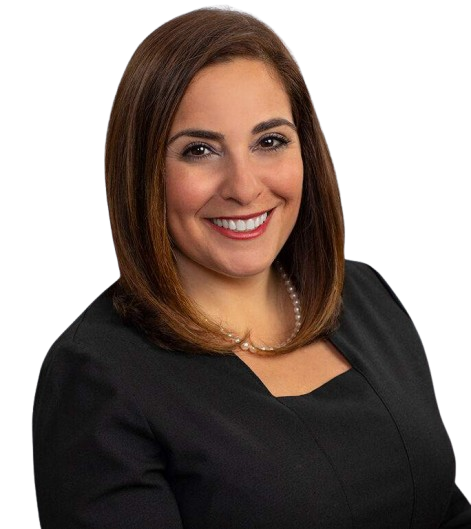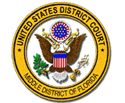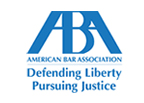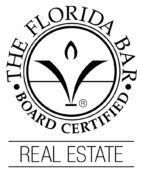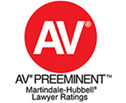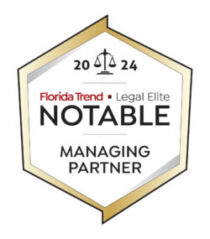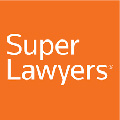- Overview/Video
- Practice Areas
- Accountant Liability
- Attorney Fees Expert
- Breach Of Fiduciary Duty
- Business And Corporate Disputes
- Contractual Interference
- Co-Counsel
- Consumer & Commercial Debt Collections
- Contract Disputes
- Derivative Actions
- Dissolution Actions
- Escrow Disputes
- Franchise Litigation
- Motion To Lift Stay
- Non-Compete, Non-Solicit, And Trade Secrets
- Partnership Disputes
- Trademark & Copyright Infringement
- Trust & Probate Litigation
- Unfair Business Practices
- FAQs
- Client Reviews
Tampa Business Litigation Attorneys
“There is nothing more rewarding for us than solving someone’s problem. As lawyers, what we often tell clients is, don’t worry, go home and sleep well tonight, we’ve got this.”
Although we pursue every possible avenue to help our clients avoid business litigation and stay out of court, situations often arise when it becomes necessary to either defend a position in court or to file a business lawsuit. In those instances, our Tampa business lawsuit and litigation attorneys bring to bear the skill needed to provide corporate clients with aggressive and honorable representation. We represent Florida’s small and medium-sized businesses in all aspects of pretrial, trial, appellate and post-judgment proceedings in state and federal court as well as in administrative hearings. We are also available to assist in collection.
When you work with our firm, you will receive the benefit of litigators who have worked at some of Florida’s largest law firms and thus have the experience and skills you might expect from such a legal background. This, coupled with our small-firm emphasis on client satisfaction, results in an ability to provide high-value service to business clients in Tampa, St. Petersburg and elsewhere in the state.
Business Litigation Practice Areas
-
Investors, businesses, and creditors may be entitled to hold a professional accountant liable for losses they suffered if those losses are the result of their reasonable reliance and the accountant was negligent. Accountants may also face liability for mistakes or misrepresentations that qualify as a breach of the accountant’s fiduciary duty.
-
Attorney fees are often awarded to the prevailing party in a civil lawsuit; however, the amount of the fee award can turn into a dispute every bit as contentious – or more so – than the underlying litigation. Having an experienced attorneys’ fee expert on your side is often the key to being awarded an amount that accurately reflects the time and effort spent on a case.
-
Corporate directors and officers can be held legally liable for breaching the fiduciary duty owed to shareholders and the corporation itself; however, the Business Judgment Rule shields directors and officers from liability for most decisions. Some ways to overcome the protection afforded by the Business Judgment Rule include showing that a breach of duty was coupled with a transaction involving an “improper personal benefit,” an improper distribution, a deliberate disregard for the best interests of the company, willful misconduct or a criminal violation.
-
Business disputes can occur for a wide variety of reasons. Failing to properly address a business dispute early on can result in lost revenue or costly judgments. Conversely, getting an experienced attorney on board as soon as a dispute arises dramatically increases the likelihood of a resolution that does not require contentious and costly litigation.
-
If you operate a business, you undoubtedly enter into contracts with various parties in the regular course of business. Contractual interference occurs when a third party, who is not a party to the contract, causes a contracting party to breach the contract. In Florida, to be successful in a contractual interference lawsuit, you must prove that you had a valid contractual relationship with a second party of which a third party was aware and that the third party intentionally interfered with that contractual relationship, causing you financial harm.
-
Attorneys and law firms frequently need to secure local co-counsel to assist with everything from administrative tasks to litigating class action lawsuits. Bringing local counsel onboard ensures you have an intimate understanding of local rules, players, and practices that can provide you with a winning advantage.
-
Debtors in the State of Florida have a variety of rights under the Fair Debt Collection Practices Act, the Florida Consumer Collection Practices Act, and the Truth in Lending Act. Whether you are a debtor or creditor involved in a dispute over an alleged violation of these rights, it is in your best interest to consult with an experienced consumer and commercial debt collection attorney to ensure that you understand the complex nature of Florida’s debt collection laws and practices.
-
Contract disputes typically arise for two common reasons. The first involves an allegation that one party has failed to live up to their obligations under the terms of the contract, causing financial harm to the non-breaching party. The second cause of contract disputes is rooted in ambiguous language within the terms of the contract, resulting in disagreement between the parties over how to interpret the language.
-
A derivative action is brought by a shareholder on behalf of a corporation against a third party. Most commonly, a derivative action is brought against a director or officer of a corporation based on allegations that the director or officer has breached their fiduciary duty, committed fraud, engaged in self-dealing, or committed some other type of malfeasance that harmed the corporation.
-
“Dissolution” refers to the formal process involved in closing a business. As the name implies, a voluntary dissolution occurs when the shareholders decide to close the business. Working with an experienced attorney during voluntary dissolution is crucial to avoid shareholder liability for unpaid debts. A business can also be forced into involuntary dissolution by court order, a process that should be avoided whenever possible as it can be costly and may result in a significant loss of assets.
-
When an offer to purchase is accepted by the seller in a residential or commercial real estate transaction, the buyer deposits “earnest money” into an escrow account as a tangible token of good faith. The seller, in turn, typically marks the listing as “under contract” or even removes the listing entirely. If the sale does not go through as planned, a dispute can arise over access to the funds held in the escrow account. To avoid time-consuming and costly litigation, mediation is often used to resolve escrow disputes.
-
Your local McDonald’s is likely to operate under a franchise agreement wherein McDonald’s is the franchisor and the party operating the McDonald’s is the franchisee. Through a franchise agreement, the franchisee gains immediate name recognition through the right to use a trade name as well as the right to use the franchisor’s business model. The franchisor gains royalties and business expansion. Franchise agreement disputes may occur over things such as an alleged violation of the non-compete clause, failure to pay royalties or misuse of proprietary information.
-
When a debtor files for bankruptcy protection, an automatic stay is ordered that prevents any further attempt to collect on debts and freezes all legal action related to the collection of debts. The court can, however, lift the automatic stay if a creditor or other party can show that the stay has harmed or will harm their property interests, contractual rights, or legal claims.
-
Non-compete, non-solicit, and non-disclosure agreements are commonly used by businesses when hiring new employees to protect trade secrets, client lists, and other proprietary information. Florida law enforces such agreements as long as they are reasonably necessary to protect a legitimate business interest, and they impose reasonable time and geographic restrictions.
-
Ideally, parties wishing to form a formal partnership will execute a partnership agreement that spells out the terms of the agreement between the parties as well as provides guidance about how disputes should be resolved should they arise. Even with a formal partnership agreement in place, disagreements over partnership assets, resources, and business opportunities can occur. Failing to resolve a partnership dispute early on can lead to a substantial loss of profits, irreparable harm to business reputation, and even destruction of the partnership.
-
Trademarks and copyrights are often valuable business assets that are protected by law. Trademark infringement occurs when another party uses a service or trademark without authorization and in a way that likely confuses the source of the services and/or goods, while copyright infringement involves unauthorized use, reproduction, distribution, performance, or public display of an original protected work. Whether you are enforcing a violation of a trademark or copyright or defending accusations of infringement, it is essential to have an experienced attorney on your side given the complex nature of trademark and copyright laws.
-
Probate and trust administration disputes can occur among beneficiaries or between a beneficiary and an Executor or Trustee. Legal challenges to the validity of the underlying Last Will and Testament or Trust Agreement may also result in protracted litigation. These disputes can hold up the distribution of trust or probate assets and may ultimately diminish the value of the trust or estate assets if the dispute results in litigation.
-
The Florida Deceptive and Unfair Trade Practices Act (FDUTPA) protects consumers and businesses from “unfair methods of competition, or unconscionable, deceptive, or unfair acts or practices in the conduct of any trade or commerce.” If you are successful in an unfair business practices claim, the court may order the business to stop the unfair practice, and you may be entitled to monetary damages for losses you incurred as a result of the unfair practices.
Florida Supreme Court Mediator
As a Florida Supreme Court certified circuit civil mediator, attorney Jeff Lieser, brings the unique skills and expertise he has gained as a mediator to every case Lieser Skaff handles, including a knowledge of law and procedure, exceptional communication and negotiation skills, and the ability to identify key opportunities for resolution.
When representing clients, we leverage this to increase the likelihood of an advantageous out-of-court settlement that avoids a costly and time-consuming trial while also ensuring a positive outcome for the client. When a settlement cannot be reached, a mediator’s meticulous attention to detail and propensity for strategic thinking make a favorable resolution in court more likely.

Frequently Asked Questions about Business Litigaiton
- 1. Will my case go to trial?
- 2. Is it better to settle my case or go to trial?
- 3. Are there alternatives to going to trial?
- 4. Who will work on my case?
- 5. How will we communicate with each other?
- 6. What type of clients do you usually work with?
- 7. How many clients have you represented over the years?
- 8. Where are your clients from?
- 9. How do you bill for your services?
- 10. Do you require a retainer?
- 11. Can you tell me how much my case will cost?
-
1. Will my case go to trial?
Settling your case without the need for protracted and expensive litigation is always our goal. With that in mind, most cases do settle before reaching the trial stage; however, when an out-of-court settlement becomes impossible, taking your case to trial may become necessary.
-
2. Is it better to settle my case or go to trial?
Generally, it is better to settle a case without going to trial when possible because a trial can be physically, emotionally, and financially draining. If you can reach an advantageous out-of-court settlement that you believe resolves the dispute or settles the issue to your satisfaction, there would be little to gain by going to trial. On the other hand, going to trial may be necessary and in your best interest if a satisfactory settlement is not forthcoming.
-
3. Are there alternatives to going to trial?
Yes. Once your attorney understands the issues involved and has a clear idea of your position on those issues, your attorney will reach out to the opposing party to begin negotiating a potential settlement. Sometimes, a settlement can be reached quickly and without incurring significant legal fees. Another option that avoids trial is mediation which involves a neutral third party assisting both sides to move toward an agreement. Certified mediators are usually attorneys, but they do not evaluate the legal merits of your case nor offer advice. A mediator’s job is to ascertain what is most important to each party and identify areas of potential compromise with the goal of using that information to structure a mutually agreeable settlement.
-
4. Who will work on my case?
One of our highly skilled and experienced senior attorneys will oversee, if not directly work on, your case. Stephanie Martin is in charge of our real estate practice group while Bo Sellitti supervises our business practice group. If you have a transactional law case, Ghada Skaff will be the senior attorney overseeing your case. Our exceptionally educated and competent associates may also work on your matter which keeps your costs down as they have a lower billable hourly rate.
-
5. How will we communicate with each other?
We make every effort to respond to all client communications within 24 hours. To achieve that goal, we use a variety of methods depending on what is convenient for our clients, including telephone calls, emails, Zoom meetings, and in-person consultations.
-
6. What type of clients do you usually work with?
Our client base includes everyone from individuals seeking assistance with a private matter to Fortune 500 companies involved in complex litigation in federal court. In addition, our clients represent a wide variety of industries, including restaurants, construction companies, real estate developers, and general contractors, as well as homeowner and condo associations, commercial landlords, start-ups, and digital media companies.
-
7. How many clients have you represented over the years?
Collectively, our attorneys have represented thousands of clients over the decades they have been practicing law.
-
8. Where are your clients from?
Most of our clients hale from the Tampa Bay area; however, we represent clients all over the state of Florida. As such, we often travel throughout the state in service to our clients. We also represent clients based outside the State of Florida who have legal or business interests in Florida.
-
9. How do you bill for your services?
We are very judicious in terms of the time spent and billed. Having been clients ourselves over the years we understand the value of our clients’ hard-earned money, and we will always work with you to ensure that the amount of time you are billed for is reasonable. Our time spent on your matter is billed in increments of 1/10th of an hour. For example, if we spent six minutes drafting an email or communicating via telephone regarding your case, your bill will reflect a 0.1 (1/10th of an hour) charge. This ensures that you will only be charged for the actual time we spent on your case.
-
10. Do you require a retainer?
Yes. The amount will vary based on the complexity of the matter. We typically require a minimum retainer of $5000 for litigation matters and a minimum retainer of $2500 for non-litigation matters.
-
11. Can you tell me how much my case will cost?
Understandably, this is one of the commonly asked questions during an initial consultation with a prospective client. Often, the potential cost of litigating a dispute heavily impacts your decision on whether to pursue the matter. While there are some scenarios in which an attorney can provide a client with an accurate estimate of fees for services rendered, such as the cost of preparing the documents needed to form a Limited Liability Company (LLC), it is often difficult to know with any certainty exactly how much a case will cost. It is possible, however, to explain the factors that typically influence the amount of legal fees you will incur during a case, including
- Complexity: When the facts and/or the law are complex, it usually costs more to litigate the issue. Multiple parties on either side of the litigation also tend to increase the legal fees because there is simply more work involved.
- Desire to settle: To reach an out-of-court settlement that prevents a costly trial, both sides must be willing to negotiate in good faith and be willing to compromise.
- Ancillary fees: Some cases require extensive investigation by a third-party investigator and/or call for expert testimony, both of which can increase the costs involved in the case.
- Trial or Settlement: Not surprisingly, if your case goes to trial, your legal fees will be significantly higher than if it settles without the need for a trial.
Client Reviews
-
In the past few years I have dealt with several attorneys for various legal reasons, both personal and business, and out of all of them Jeff and Ghada have been the most exceptional without a doubt.

-
Jeff Leiser was the 5th attorney I talked to about a case that I was losing. Everyone else that I talked to told me to plan on filing BK because they did not see me overcoming the case. A copier company was coming after me for a lot of money for a contract that I signed a personal guarantee on.

-
This is my first review of any business but if you are looking for the best then these are the people you want to represent you. Wonderful group of attorneys, I have never seen anyone devote the kind of time and attention to handling a case that i experienced here.


Lieser Skaff recognized by Best Lawyers in Commercial Litigation and Real Estate Law.


